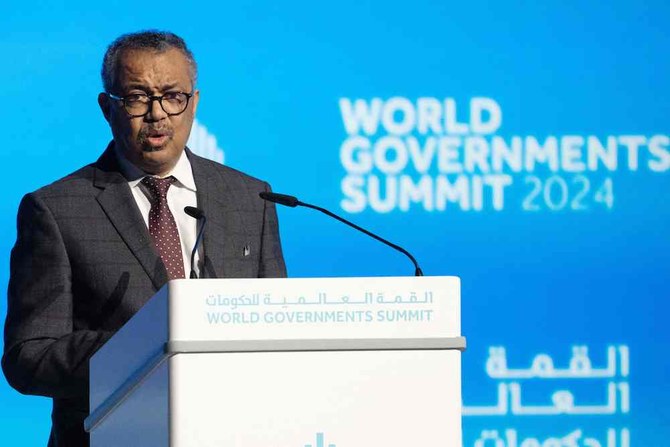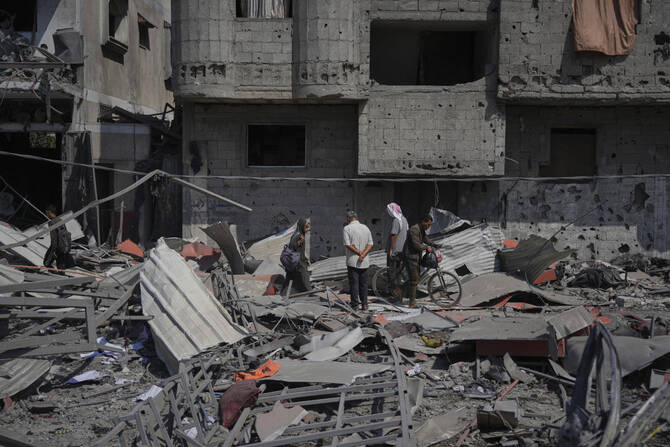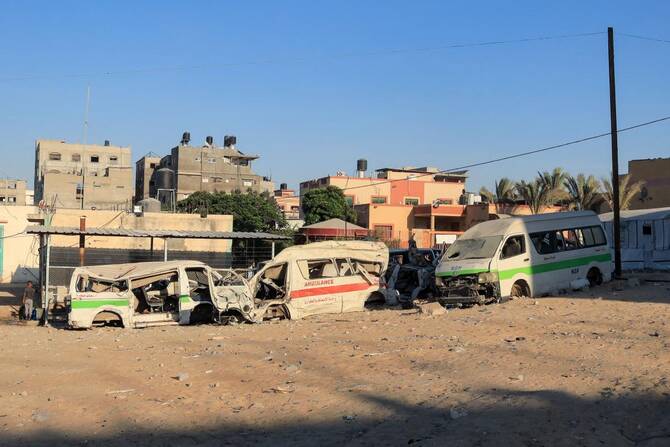LONDON: The head of the World Health Organization said on Monday the humanitarian situation in Gaza was dire, adding that current levels of medical supplies reaching the Palestinian enclave were “only a drop in the ocean of need.”
Tedros Adhanom Ghebreyesus was speaking at the World Governments Summit in Dubai and during his address he reiterated calls for a ceasefire in Israel’s war on Gaza that has ravaged the area.
“WHO continues to call for safe access for humanitarian personnel and supplies,” he told the summit. “We continue to call for hostages held by Hamas to be released. And we continue to call for a ceasefire.”
He added he was deeply concerned by Israeli attacks on Rafah where most of the enclave’s inhabitants have fled and where strikes killed 48 people overnight.
“Only 15 out of 36 hospitals are still partially or minimally functioning, and Gaza health workers are doing their best in impossible circumstances,” he said.
“I am especially concerned by the recent attacks on Rafah where the majority of Gaza’s population has fled the destruction.
“So far, we have delivered 447 metric tons of medical supplies to Gaza, but it’s a drop in the ocean of need, which continues to grow every day,” he added.
The latest conflict broke out after attacks on Oct. 7 by Hamas fighters in Israeli towns, which killed 1,200 people and around 250 hostages seized, according to Israeli figures.
The war, now entering its fifth month, has killed more than 28,000 people in Gaza, health authorities in the Hamas-run enclave have said.
Tedros said lessons were not being learned from the COVID-19 pandemic and that the world was not prepared for a new pandemic, which he added was inevitable.
“If the world fails to learn from these lessons, it will pay dearly next time,” he said. “And there will be a next time. History teaches us that the next pandemic is a matter of when — not if.”
He continued: “It may be caused by an influenza virus, or a new Coronavirus or it may be caused by a new pathogen we don’t even know about yet. Tomorrow we would face many of the same problems we face with COVID-19.”
Tedros rejected what he called “a litany of lies and conspiracy theories” surrounding current negotiations on an international agreement on pandemic preparedness and response.
Since December 2021, when WHO member states met in Geneva to begin drafting a global agreement, efforts have been ongoing to reach a consensus ahead of the World Health Assembly in May.
But “obstacles remain” to meet that deadline, Tedros said, due to misinformation about the agreement being a “power grab by the World Health Organization.”
He rejected those accusations, adding that all countries needed to work together to share information, knowledge and expertise to detect and contain pathogens presenting a risk, and timely access to tests, treatments and vaccines.
“The COVID-19 pandemic inflicted huge losses on communities, countries, businesses and economies. Those losses must not be in vain and must not be repeated,” he said.
“It’s possible or even likely that we will face another pandemic in our lifetimes. We can’t know how mild or severe it might be. But we can be ready.”






















